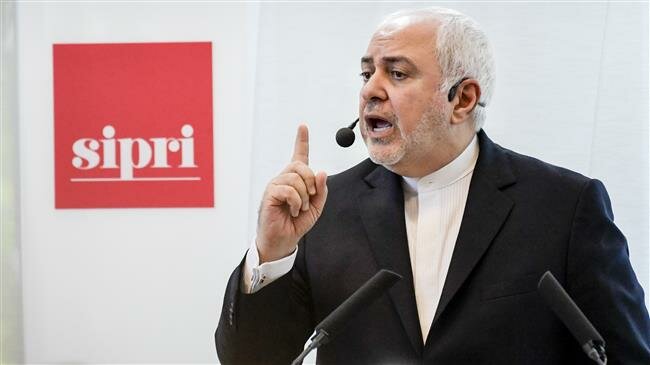Speaking at the Stockholm International Peace Research Institute (SIPRI) during a visit to Sweden, Iranian Foreign Minister Mohammad Javad Zarif made the comments Wednesday amid the US military presence in the Persian Gulf.
He added that Iran has already fulfilled all of its commitments under the Joint Comprehensive Plan of Action (JCPOA) and the United Nations Security Council Resolution 2231, which enshrines it.
“This is an agreement, this was not a diktat,” he said. “We did not dictate it to the other side obviously, but the other side did not obviously dictate it to us to some people’s chagrin.”
“Iran according to 15 reports of the IAEA (the International Atomic Energy Agency) … has complied with the Resolution 2231 and with the JCPOA,” he said. “Even five IAEA reports came after US withdrawal, it still showed that we don’t violate [the deal].”
Washington abandoned the landmark deal in May 2018, when President Donald Trump said he was going to use sanctions and other measures in his power to force Iran into renegotiating another deal that addresses the country’s missile program and its growing role in the Middle East region.
Zarif noted that the US, under Trump, is unpredictable and does not comply to the international law.
He said Iran behaves in a predictable manner and expects predictable behavior in response.
“Mutual unpredictability will lead to chaos. Because President Trump cannot expect to be unpredictable and expect other people to be predictable. Unpredictability will lead to mutual unpredictability and unpredictability is chaotic,” Zarif said.
Since Trump’s exit, Iran has ruled out the possibility of revising the current JCPOA or negotiating a new one. It has also warned the other signatories — the UK, France, China, Russia and Germany — to either salvage the deal by meeting their commitments or watch the Islamic Republic also stop implementing the JCPOA.
While China and Russia have signaled that they would continue trade with Iran at highest possible levels, the UK, France and Germany have been struggling to come up with a response to US pressure.
They had promised Iran that they would continue trade as usual using a special payment channel called the Instrument in Support of Trade Exchanges (INSTEX) but have yet to make it operational months after its much-delayed official launch in January 2019.
Zarif said the European “failed” to deliver their commitments and needed to take action if they wanted to save the deal.
In a display of impatience with the Europeans, Tehran has on two occasions reduced its commitments under the JCPOA in accord with mechanisms that the agreement provides for dealing with non-compliance, including increasing its enriched uranium stockpiles beyond the 300-kg limit and enriching uranium to purity levels beyond the 3.67 percent agreed in the deal.
Zarif defended Iran’s response to the non-compliance at the SIPRI and said the third stage would bring about bigger changes.
“If the other side violates the deal we have a right at a remedy to reduce our commitments to the deal,” he argued. “This is written in the deal.”
Zarif also decried the US military presence in the region, asserting that it would increase insecurity.
“No amount of foreign military presence (in the Persian Gulf) can prevent insecurity in this region. Security is a common global commodity. We have to accept either security for everybody or insecurity for everybody,” said the top Iranian diplomat. “You cannot have an island of security by your fleet in the Persian Gulf when the United States is waging an economic war against Iran. When the United States is forcing countries to seize our ships in Gibraltar, in the Suez Canal, in Singapore. That’s insecurity. Global security is intertwined.”
